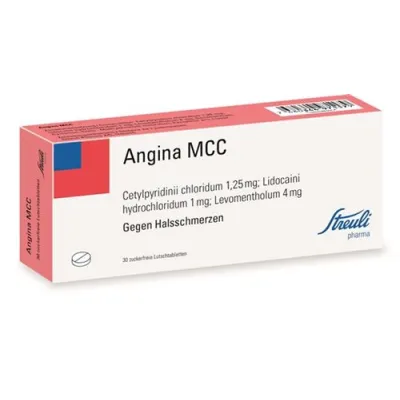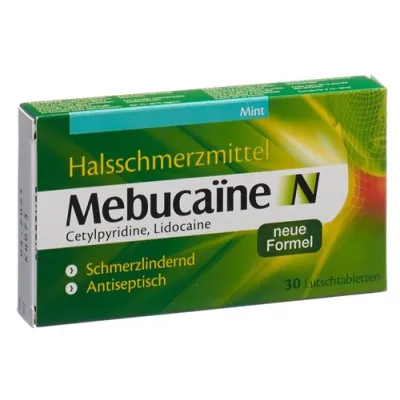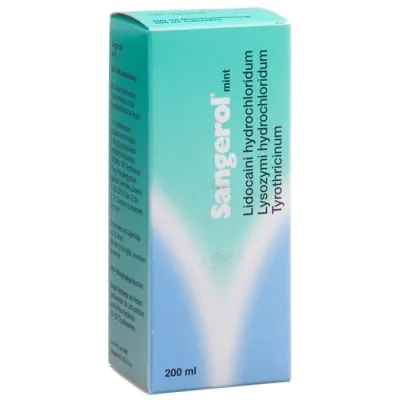Throat infections
(1 Pages)
Angina mcc streuli lozenges 30 pcs
Angina MCC lozenges consist of a combination of cetylpyridine, lidoc. and menthol. While cetylpyridine is responsible for the germicidal effect of the lozenge, lidoc. relieves pain in the mucous membrane of the oral cavity, pharynx and larynx and thus relieves swallowing difficulties. Menthol gives the lozenges a pleasant taste. Angina MCC is used for infections or inflammations in the mouth and/or throat (angina, laryngitis or pharyngitis) and diseases of the mouth and/or throat mucosa (aphthae, stomatitis). Angina MCC can also be taken after tonsillectomy or tooth loss. Swissmedic-approved patient informationAngina MCC®Streuli Pharma AGAMZVWhat is Angina MCC and when is it used ?Angina MCC lozenges consist of a combination of cetylpyridine, lidoc. and menthol. While cetylpyridine is responsible for the germicidal effect of the lozenge, lidoc. relieves pain in the mucous membrane of the oral cavity, pharynx and larynx and thus relieves swallowing difficulties. Menthol gives the lozenges a pleasant taste. Angina MCC is used for infections or inflammations in the mouth and/or throat (angina, laryngitis or pharyngitis) and diseases of the mouth and/or throat mucosa (aphthae, stomatitis). Angina MCC can also be taken after tonsillectomy or tooth loss. When should Angina MCC not be used?Angina MCC should not be used if there is a known hypersensitivity to one of the ingredients. When is caution required when taking Angina MCC?In the case of bleeding wounds in the mouth or throat, the lozenge should be taken with caution - if at all. If the fever is higher or if there is no improvement within a week, a doctor should be consulted. Inform your doctor, pharmacist or druggist if you suffer from other illnesses, have allergies or are taking other medicines (even those you bought yourself!) or using them externally! Can Angina MCC be used during pregnancy or while breastfeeding?Based on previous experience, there is no known risk for the child if used as directed. However, systematic scientific investigations have never been carried out. As a precaution, you should avoid taking medicines during pregnancy and breastfeeding or ask your doctor, pharmacist or druggist for advice. How do you use Angina MCC?For adults and children over 6 years old: Dissolve one tablet slowly in your mouth every hour. After the acute symptoms have subsided or as a preventive measure, suck 1 tablet every 3-4 hours. The lozenges are suitable for diabetics. Stick to the dosage given in the package leaflet or as prescribed by your doctor. If you think the medicine is too weak or too strong, talk to your doctor, pharmacist or druggist. What side effects can Angina MCC have?The following side effects can occur when taking Angina MCC: Excessive or prolonged use of Angina MCC can cause local irritation. In the case of fresh injuries in the mouth, there is a risk of bleeding. If you notice side effects that are not described here, you should inform your doctor, pharmacist or druggist. What else needs to be considered?The medicinal product may only be used up to the date marked «EXP» on the container. Store at room temperature (15-25°C). Keep out of the reach of children. Your doctor, pharmacist or druggist can provide you with further information. These people have the detailed information for specialists. What does Angina MCC contain?1 lozenge contains: Active ingredients: 1.25 mg cetylpyridine chloride; 1.0 mg lidoc. chloride; 4.0 mg menthol. Excipients: Saccharin, cyclamate, the dye methylthionine and other excipients. Approval number34497 (Swissmedic) Where do you get Angina MCC? What packs are available?In pharmacies and drugstores, without a doctor's prescription. Packs of 30 and 50 lozenges. Authorization holderStreuli Pharma AG, 8730 Uznach This leaflet was last checked by the drug authority (Swissmedic) in October 2003. ..
9.99 USD
Mebucaine n lozenges new formula 30 pcs
What is Mebucaine N and when is it used? Mebucaine N contains the antiseptic active ingredient cetylpyridine chloride and the local analgesic active ingredient lidoc. hydrochloride. Mebucaine N is used for the short-term symptomatic treatment of pain used for mild inflammation in the mouth and throat. What should be considered? Note for diabetics: 1 Mebucaine N lozenge contains 1,107 g sorbitol, which is approximately 12 kJ (2.88 kcal).When must Mebucaine N not be used?Mebucaine N must not be used in case of hypersensitivity to cetylpyridine chloride, lidoc. hydrochloride, to other local anesthetics or to one of the excipients according to the composition. Mebucaine N is not recommended for people under the age of 18 due to insufficient data on its use.When should caution be used when using Mebucaine N?Mebucaine N should not be used on bleeding wounds in the mucous membrane, as the absorption of the active ingredients into the blood may be increased. This applies in particular to patients with cardiovascular diseases or a tendency to cramps.Caution is required in patients with impaired liver and/or kidney function, as these limitations can lead to increased concentrations of the active substance in the blood. Mebucaine N is intended for short-term use for a maximum of 3 consecutive days.You should consult your doctor in the following cases: If you have had a sore throat and fever for a few days.If the symptoms persist or worsen, or if there is no improvement after 3 days.If the sore throat is caused by high accompanied by fever, drowsiness or vomiting: stop the treatment and consult your doctor.If you have injuries to the mucous membranes of the mouth and throat; caution is advised when using it.Do not use Mebucaine N while or immediately before drinking or eating: the local anesthetic effect of lidoc. can cause a temporary numbness in the mouth and throat and make swallowing difficult . Alcoholic beverages should be avoided, as alcohol increases the absorption of cetylpyridine chloride in the blood, which could lead to an overdose. Mebucaine N should not be taken immediately before or after brushing your teeth may reduce the effectiveness of Mebucaine N.1 lozenge of Mebucaine N contains 1,107 g of sorbitol (E420): sorbitol is a source of fructose. Talk to your doctor before using this medicine if your doctor has told you that you have an intolerance to some sugars or if you have hereditary fructose intolerance (HFI) - a rare inherited condition in which a person cannot break down fructose - was determined. Patients with hereditary fructose intolerance should not use this medicine.Tell your doctor, pharmacist or druggist if you suffer from other diseases,have allergies oruse other medicines (including those you bought yourself!).May Mebucaine N be used during pregnant or breastfeeding? Mebucaine N should not be used during pregnancy unless directed by a doctor. The active ingredient lidoc. enters the human body in very small amounts breast milk over. Mebucaine N should not be used while breastfeeding.How do you use Mebucaine N?Unless otherwise prescribed by the doctor:Mebucainee N is intended for short-term use for a maximum of 3 consecutive days. The lowest effective dose should always be used over the shortest possible treatment period. The recommended dosage and application frequency must not are exceeded. Do not use at the same time as other antiseptic (disinfecting) agents. Adults 1 lozenge every 2 to 3 hours, up to 6 times a day , let it slowly melt in your mouth. Maximum daily dose: Do not exceed 6 lozenges within 24 hours.Do not chew the lozenges or swallow them whole. Do not use while or immediately before drinking or eating (see «When should you be careful when using Mebucaine N?»). If you experience severe pain, difficulty swallowing, increased salivation, fever or if after 3 -day treatment does not improve, a doctor should be consulted.If you have used more Mebucaine N than you should (overdose):Taking a large Amount of Mebucaine N lozenges can cause nausea, vomiting, lowering of blood pressure, changes in heart rhythm, impaired breathing, seizures, coma, cardiac and respiratory arrest.After ingestion of a large amount of Mebucaine N, immediate ingestion of milk or egg whites whipped in water. Consult a doctor immediately.Children and adolescents:Mebucaine N is not recommended for people under the age of 18 because there is insufficient data on its use.Stick to the dosage given in the package leaflet or prescribed by your doctor. If you think the medicine is too weak or too strong, talk to your doctor, pharmacist or druggist.What side effects can Mebucaine N have? Mebucaine N can cause side effects.Rare (affects 1 to 10 users in 10,000): changes in taste, numbness of the tongue, nausea, irritation of the mouth and throat. Very rare (affects less than 1 user in 10,000): skin rashes, hypersensitivity reactions.If you use more Mebucaine N than you should (overdose): See instructions under «How do you use Mebucaine N?»If you notice any side effects, contact your doctor, pharmacist or druggist. This also applies in particular to side effects that are not listed in this leaflet.What else should be observed?The medicinal product may only be used up to the end of the period marked "EXP" on the container Date are used.Storage instructionsStore at 15-30°C. Keep in the original packaging. Keep out of the reach of children. Your doctor, pharmacist or druggist can provide you with further information. These people have the detailed technical information.What does Mebucaine N contain?Active ingredients1 lozenge Mebucaine N contains: cetylpyridine chloride 2 mg, lidoc. hydrochloride 1 mg ExcipientsAcesulfame potassium, microcrystalline cellulose, citric acid monohydrate, macrogol 6000, magnesium stearate, corn starch, sorbitol (E420), peppermint oil and levomenthol.1 Lozenges contain 1.107 g sorbitol, equivalent to 12 kJ (2.88 kcal).Authorization number66256 (Swissmedic).Where can you get Mebucaine N? What packs are available?In pharmacies and drugstores, without a doctor's prescription. Packs of 20 and 30 lozenges. Authorization holder Spirig HealthCare AG, 4622 Egerkingen This leaflet was published in September 2020 last checked by the drug authority (Swissmedic)...
46.86 USD
Sangerol mouthwash mint without sugar bottle 200 ml
Sangerol mouthwash solution and mouth spray are medicines for the treatment of diseases of the mouth and throat, such as sore throat, difficulty swallowing, aphthae, inflammation of the oral mucosa and gums. Sangerol can be used to help treat angina and hoarseness. Sangerol can also be used before and after surgical procedures in the mouth and throat, such as tonsillectomy, jaw surgery and dental procedures. Lido. reduces pain on the mucosal surface. Lysozyme is an endogenous defense against various bacteria and viruses. It also inhibits any pus formation. Tyrothricin is an antibiotic that acts on the mucous membranes and fights the bacteria in the mouth and throat. In many cases, it also acts on bacteria that are resistant to other antibiotics. Allergy to tyrothricin is rare. Swissmedic-approved patient informationSangerol® Melisana AG What is Sangerol and when is it used? Sangerol mouthwash and mouth spray are medicines used to treat diseases of the mouth and throat, such as sore throat, difficulty swallowing, aphthous ulcers, inflammation of the oral mucosa and gums. Sangerol can be used to help treat angina and hoarseness. Sangerol can also be used before and after surgical procedures in the mouth and throat, such as tonsillectomy, jaw surgery and dental procedures. Lido. reduces pain on the mucosal surface. Lysozyme is an endogenous defense against various bacteria and viruses. It also inhibits any pus formation. Tyrothricin is an antibiotic that acts on the mucous membranes and fights the bacteria in the mouth and throat. In many cases, it also acts on bacteria that are resistant to other antibiotics. Allergy to tyrothricin is rare. What should be considered?Note for allergy sufferers: Sangerol contains lysozyme from egg/protein. When must Sangerol not be taken/used?The preparation should not be taken if there is a known hypersensitivity to one or more ingredients in Sangerol or to hen's egg white. When is caution required when taking/using Sangerol?Inform your doctor, pharmacist or druggist if you– Suffering from other diseases, – Have allergies or – Take other medicines (including those you bought yourself!) or use them externally. Serious allergic reactions (such as skin rash, swelling of the face or airways, narrowing of the airways, circulatory complications and anaphylactic shock) can occur when taking Sangerol. Furthermore, isolated cases of severe skin and mucous membrane damage were reported. Some of the serious reactions were life-threatening. If allergic or skin reactions occur, a doctor should be consulted immediately and treatment with Sangerol should be discontinued. If the fever is higher or if there is no improvement within 5 days, a doctor should be consulted. The use of Sangerol is not recommended for children under 12 years of age. Can Sangerol be taken/used during pregnancy or while breastfeeding?Sangerol must not be used during pregnancy and breastfeeding, or only for a short time, in the usual dosage and after taken or used in consultation with the doctor. How do you use Sangerol?Adults and adolescents over 12 years of age: Mouth rinsing solution: Depending on the severity of the inflammation, leave 15 ml (1 measuring cup) of mouth rinsing solution to work in the mouth and throat area up to 5 times a day for 30-60 seconds for 3 to a maximum of 5 days . Mouth spray: depending on the severity of the infection, treat the inflamed areas up to a maximum of 5 times a day with 2-3 spray puffs for 3 to a maximum of 5 days. The use and safety of Sangerol in children under the age of 12 has not yet been tested. Follow the dosage given in the package leaflet or as prescribed by your doctor. If you think the medicine is too weak or too strong, talk to your doctor, pharmacist or druggist. What side effects can Sangerol have?The following side effects can occur when taking or using Sangerol: Taking Sangerol mouth spray on an empty stomach can cause nausea and burning in the stomach in sensitive people appear. In these cases, the mouthwash solution can be used. Very rarely, acute allergic reactions up to and including anaphylactic shock have been reported (see «When should caution be exercised when using Sangerol?»). Isolated cases of serious skin reactions have been reported. If allergic or skin reactions occur, a doctor should be consulted immediately and treatment with Sangerol should be discontinued. If you notice any side effects that are not described here, you should inform your doctor or pharmacist. What else needs to be considered?Sangerol, like all medicines, must be kept out of the reach of children. Protect from light and store at room temperature (15-25ºC). The medicinal product may only be used up to the date marked «EXP» on the container. Your doctor, pharmacist or druggist can provide you with further information. These people have the detailed information for specialists. What does Sangerol contain?15 ml mouthwash solution contain lidoc. hydrochloride 5.33 mg, lysozyme hydrochloride 8 mg (=160'000 U. FIP), tyrothricin 10 mg, xylitol, propylene glycol, flavorings, colourings: quinoline yellow (E 104), patent blue (E 131), preservative: methyl p-hydroxybenzoate (E 218), propyl p-hydroxybenzoate (E 216) and other auxiliary materials. 1 ml spray solution contains: lidoc. hydrochloride 0.355 mg, lysozyme hydrochloride 0.53 mg (=10'700 U.FIP), tyrothricin 0.67 mg, xylitol, propylene glycol, flavorings, coloring: quinoline yellow (E 104 ), patent blue (E 131), preservatives: methyl p-hydroxybenzoate (E 218), propyl p-hydroxybenzoate (E 216) and other additives. All Sangerol preparations are sugar-free and gentle on teeth. Approval number49437, 51808 (Swissmedic). Where can you get Sangerol? What packs are available?In pharmacies and drugstores, without a doctor's prescription. Mouth rinsing solution: 200 ml. Dosing oral spray: 20 ml, 50 ml. Authorization holderMelisana AG, 8004 Zurich. This leaflet was last checked by the drug authority (Swissmedic) in June 2016. ..
29.16 USD
(1 Pages)



